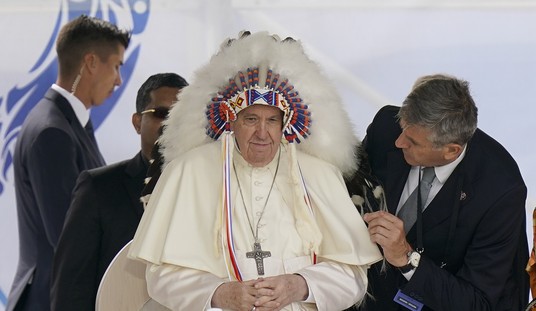Jazz already covered the topline data in this poll this morning but I want to follow Rich Lowry’s lead here and highlight Jeb’s numbers in particular. Because I’m a pessimist by nature and because I lived through elections 2008 and 2012, I just assume that the GOP establishment can and will foist the squish of its choice on the Republican electorate every four years. This year, the squish of the moment is Jeb, ergo Jeb will be the nominee. The party decides. It really is that simple.
But maybe it’s not that simple. Dude:

That’s a poll of registered voters, not of random “what time are the Kardashians on?” American adults. These are people who are paying some modicum of attention to the race, we can assume, and the result is hostility to Bush 3.0 that’s nearly as sharp as the hostility to Trumpmania. Trump, whom Bush fans everywhere will tell you is unelectable, is at 38/58 favorability among registered voters, essentially identical to Jeb himself. In fact, Trump’s numbers among independents here are slightly better than Jeb’s. He’s at 36/60; Bush is at 30/62. How often do you see a poll, as in the Bush data above, where a candidate’s popularity among Republicans is the inverse of his popularity among indies, not Democrats? What exactly is the argument for Mr. Electable again?
That’s not the only metric where Trump trumps Bush. Unlike Jeb, Trump is at least well liked by parts of the GOP base.

That’s Trump at his polarizing Trump-iest — very popular with tea partiers, hugely unpopular with liberals, mixed feelings among centrists. Jeb is less polarizing, but that’s not a good thing in his case:

The left hates him too, but tea partiers are hostile and the “neutrals,” the centrist Republicans who are supposed to carry Jeb to victory, are no warmer to him than they are to Trump. What’s going on here? A few things, I think. For starters, Bush didn’t impress at the debate. On average, he lost more ground in the polls afterward than anyone except Trump and Scott Walker, and Trump’s lead was big enough going in that he could afford to shed a few points without worry. Bush’s problems pre-date the debate, though; if you doubt that, click here and see how the green line in RCP’s poll tracker steadily declines since mid-July, right around the time Trump was really taking off. We tend to think of Trump and Bush as polar opposites, one the populist rager, the other the above-the-fray establishmentarian, but part of Trump’s base overlaps with Bush’s. Remember, according to nearly every poll, Trump’s leading not just among conservative Republicans but among moderates too. As Josh Barro said, Trump is in many ways a consummate moderate Republican; his style is angry and populist, which is typically associated with grassroots conservatism, and his immigration plan is certainly right-wing, but on various other policies (like campaign-finance reform, to take one at random) he’s a centrist. If you’re a “somewhat conservative” voter who’s leery of Cruz because he’s too dogmatic but also leery of Jeb because you’re tired of the Bushes, go figure that Trump might capture your imagination, at least for a while. Which means the default assumption that many people (me included) have been operating on, that Trump is helping Bush by bigfooting his more credible challengers, might not necessarily be true. If Trumpmania cultivates a taste in moderates for populism, Jeb has a big problem.
The other reason Jeb’s fading, as Nate Cohn notes, is that John Kasich is making a game of it in New Hampshire, offering voters there a moderate alternative to the GOP establishment’s “Bushes unto eternity” approach to presidential politics. Here’s the man himself telling CBS News last night that it wouldn’t be “humane” for the feds to go riding around in cars and deporting people or something.








Join the conversation as a VIP Member